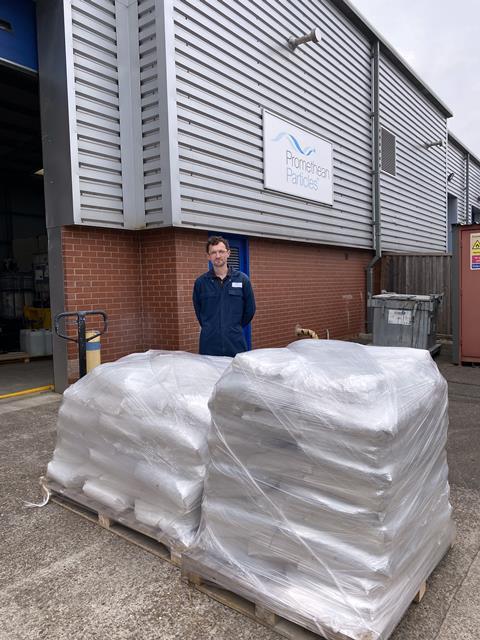Promethean Particles, a UK-based specialist manufacturer of metal-organic frameworks (MOFs) and nanomaterials, has developed a tonne-scale MOF synthesis using its proprietary flow reactor technology ‘to increase […] reliability and consistency’. Promethean has completed an initial shipment of 4 tonnes of the material.

Industrial production of MOFs remains relatively scarce, ‘mainly due to a lack of scalable manufacturing routes and, in turn, prohibitively high costs,’ explains Owen Cartmell, operations manager at Promethean. ‘However, this is now changing,’ he says. ‘Scalable and cost-effective manufacturing routes have been demonstrated,’ which stimulates the emergence of supply chains and enables more exploration of commercial applications. Other companies, including German giant BASF and US-based start-up Numat, have also successfully established MOF production at commercial scales.
The main novelty behind Promethean’s process is a solvothermal flow reactor, which ‘improves reaction kinetics, leading to significantly shorter reaction times’ than batch processes, explains Cartmell. Heating is also homogeneous and more efficient, bringing ‘economies of scale, with the cost per unit decreasing significantly [at increased] production volumes,’ he adds. With the current set-up, Promethean can produce 100kg of MOF in just under one hour, a ‘significantly higher throughput than equivalent batch processing,’ according to Cartmell.
David Fairén Jiménez, an expert in MOFs at the university of Cambridge, UK, and founder of MOF manufacturer Immaterial, says that while large-scale synthesis isn’t unprecedented, it represents ‘a solid milestone for Promethean’. Scaling is easier than commonly conceived, he says. ‘With good process control and engineering,’ lab reactions transfer well to bigger batches. ‘The real challenge is […] making sure the process is consistent and cost-efficient.’
Fairén Jiménez explains that there are advantages to both flow and batch synthesis. ‘Flow [is] efficient for high volumes and standardised manufacturing, batch offers more flexibility and control,’ he says. Immaterial, for example, uses batch methods because he believes it ‘allows tight control over product quality,’ as well as easy adaptation to manufacture MOFs for different applications. In many cases, he says, the selection (and cost) of starting materials has more influence on the price of the products than the type of reactor used. Moreover, additional processing to make the produced MOF suitable for ‘real-world systems’ and applications – known as shaping – ‘significantly increases costs, in some cases doubling the total cost of production, [which] often matters more to the overall economics than [choosing between] batch or flow,’ says Fairén Jiménez.
Promethean’s Cartmell echoes this point: ‘Our team has decades of experience in producing particles of advanced materials in continuous flow,’ says Cartmell. While crystallising solids is usually an issue in flow reactors, ‘our reactors […] overcome such issues.’ As an example, Cartmell details how, during its product and process development work, Promethean made changes to the manufacturing protocol that significantly influenced the eventual material behaviour. During manufacturing, ‘processes such as dewatering and drying ultimately impact the characteristics and performance of the final product,’ he says. ‘We continue to work with our customer to […] design a product that meets both performance and cost requirements.’
The client, a company in mainland Europe that purchased Promethean’s MOF for an ‘energy efficient gas storage solution’, is pursuing ‘a high-volume industrial application,’ says Cartmell. This is aligned with the company’s strategy, ‘focused on supporting decarbonisation and […] the energy transition,’ he explains. ‘We’re breaking new ground with the tonne scale manufacture, which is extremely exciting.’

















No comments yet